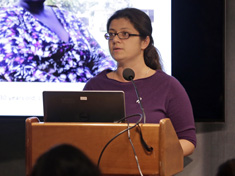-
Elena Ateva on Putting the Individual at the Center of Maternal Care
December 2, 2016 By Sean Peoples Exactly one year after the adoption of the Sustainable Development Goals in September 2015, The Lancet published a special series on achieving maternal health priorities in the SDG era, with a focus on quality, equity, strengthening entire health systems, sustainable financing, and collecting better evidence.
Exactly one year after the adoption of the Sustainable Development Goals in September 2015, The Lancet published a special series on achieving maternal health priorities in the SDG era, with a focus on quality, equity, strengthening entire health systems, sustainable financing, and collecting better evidence.Exactly one year after the adoption of the Sustainable Development Goals in September 2015, The Lancet published a special series on achieving maternal health priorities in the SDG era, with a focus on quality, equity, strengthening entire health systems, sustainable financing, and collecting better evidence.
“The series certainly serves as an inspiration for advocates on the ground,” explains Elena Ateva of the White Ribbon Alliance in this week’s podcast. Yet, these priorities “cannot happen without a commitment and continued and sustained resources for social accountability.”
For Ateva, improving quality and equity of care means prioritizing the experience of the individual. Women should be “at the center of care, at the center of policies, and at the center of advocacy efforts,” she says.
In some places, the treatment of women by health providers is as much or more of a problem than traditional capacity issues. “Evidence suggests that in countries with high maternal mortality, the fear of disrespect and abuse that women often encounter in facility-based maternity care is a more powerful deterrent to use of skilled care than commonly recognized barriers such as cost or distance,” according to the White Ribbon Alliance.
To combat the stigma, Ateva’s message is clear: go local. “[It] starts with the conversation a woman has with her provider,” she says, “then with the community and the providers and policymakers coming together and discussing the vital changes that need to happen at that level, and then it happens when communities come together to advocate for improved services.”
Ateva shares the insights of three mothers on various barriers to equitable care they encountered in Uganda, from lack of privacy in delivery wards to no handicap accessible ramps at the hospital entrance. To achieve the Sustainable Development Goals, she says, the voices of women like these “must be the starting point and not the afterthought.”
Elena Ateva spoke at the Wilson Center on October 6, 2016.
Friday Podcasts are also available for download on iTunes and Google Podcasts.
Topics: development, Dot-Mom, Friday Podcasts, gender, global health, human rights, maternal health, poverty, respectful care, SDGs, Uganda
 A Publication of the Stimson Center.
A Publication of the Stimson Center.

 Exactly one year after the adoption of the Sustainable Development Goals in September 2015,
Exactly one year after the adoption of the Sustainable Development Goals in September 2015, 




